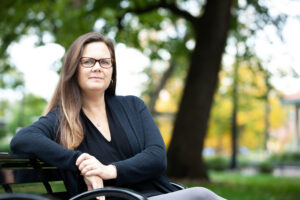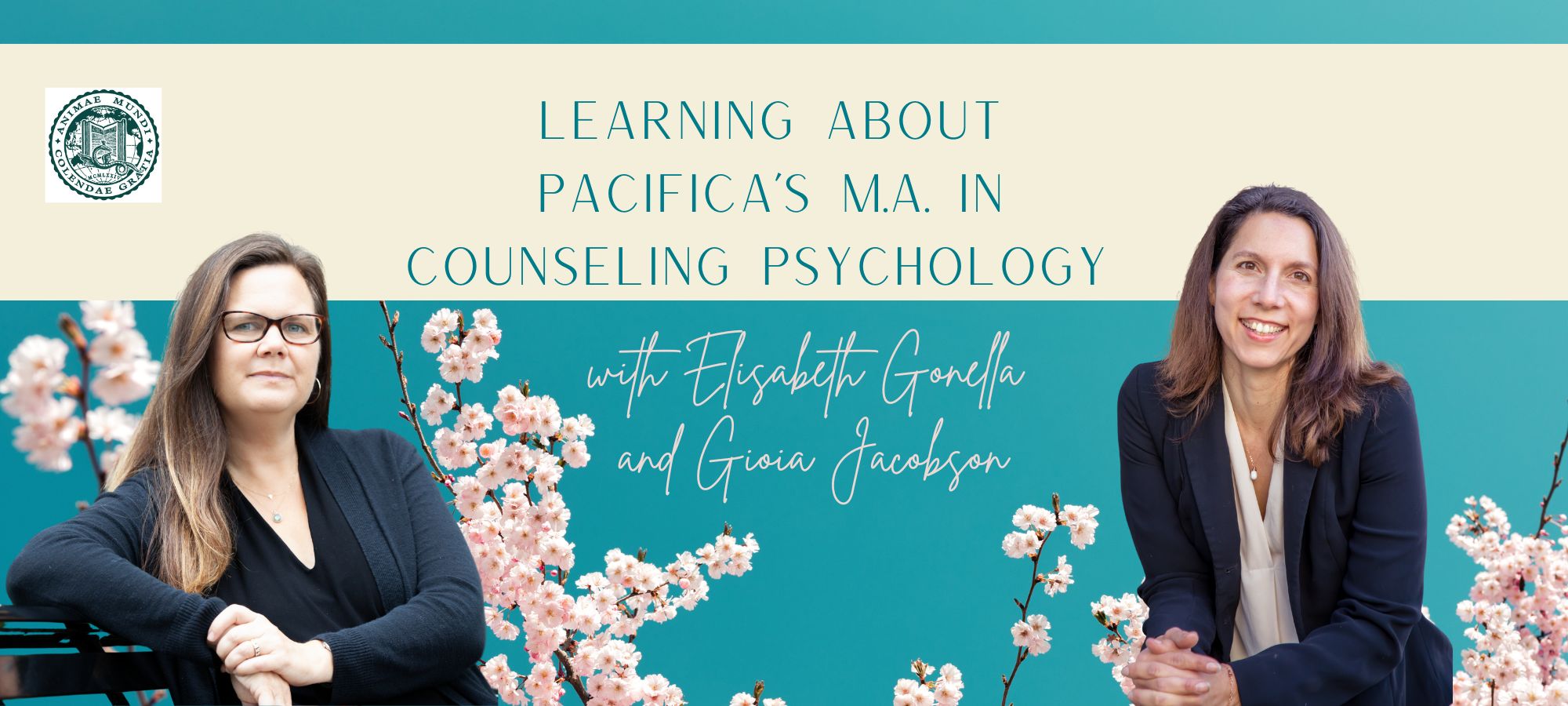Elisabeth Gonella, M.A., and Gioia Jacobson, M.A., are the Interim Department Co-Chairs of the Masters in Counseling Psychology program. I’m delighted to speak with them about the Counseling Program and their own work.
Angela Borda: One of the first things prospective students want to know is what kind of career paths follow from our degrees? For those who are not familiar with the Counseling program, can you give us the broader picture of who can enroll in the M.A.?
Elisabeth Gonella: Certainly. Our program currently leads to licensure as an MFT (Marriage and Family Therapist) or LPCC (Licensed Professional Clinical Counselor) in the State of California. Our graduates most frequently pursue these licenses in order to practice as psychotherapists in mental health agencies or in private practice settings. Graduates might also become involved in research, teaching, or go on to obtain their PhD or PsyD and become licensed as a Psychologist.
Angela: Gioia, as the Director of Research for the Counseling Department, can you give us an idea of what is afoot in the Counseling Department in terms of research and why your program is unique in that way?
Gioia Jacobson: Our research department is quite unique in the sense that no other Master’s level program is generating research on depth psychology. Students’ thesis research helps to fill a tremendous gap in the existing literature in the field and is immediately clinically applicable because of the focus of the thesis.
Angela: Elisabeth, as an alumni of Pacifica, and a Licensed Marriage and Family Therapist of 20+ years, with a private practice in Santa Barbara, what is your experience of teaching at Pacifica? What do you most appreciate about our students?
Elisabeth: I have thoroughly enjoyed my years teaching at Pacifica. Our students are engaging, thoughtful and bring rich life experience and curiosities into the classroom. The cohort model develops a sense of community within the classroom that deepens the learning for everyone. Our students tend to be able to access imagination and reach beyond the medical models of psychotherapy to recognize the value in culture, spirituality and mystery.
Angela: Gioia, I understand that your current research focuses on ecopsychology. Please tell us about your research and how it relates to counseling psychology?
Gioia: One of my recent areas of research has been on ecopsychology, including climate-related grief and psychological resilience. Themes of climate and anxiety and feeling dis-placed come into the clinical environment with greater and greater frequency as we collectively experience an uptick in weather-related disasters, and my hope is that, as clinicians, we continue to be prepared to meet individuals in their grief and hold the possibility for connection with the physical world we inhabit even in the face of sad, frightening, and difficult moments. I suppose you could characterize my research briefly as being on what it means to have a secure attachment to environment.
Angela: Elisabeth, I see that your current work focuses “on life transitions and community building by leading Mother/Daughter programs promoting ceremonial rites of passage, community choirs and collective grief tending.” That is a lot of unpack! I wonder if you could let us know how collective grief tending fits into your work? What lens does depth psychology provide for grief and life transitions?
Elisabeth: This has been meaningful work for me. The threads of grief are inherent in all life experience. The passage of time itself taps into the grief that humans carry as life consistently changes and transitions. It is powerful to hold grief in a collective space, as it allows for a layer of support to be present for those to tend to their own grief while also being witnessed to and held by the larger group. The containment of the community, of song, of movement and expression, as well as the beauty of natural gifts brought in with flowers, water, and rocks ground the experience for those involved. These symbolic elements and the inherent patterns of the collective are both aspects of community grief ritual space that resonate with a depth psychological approach. In my years as a mental health provider, I have come to recognize that there is healing that happens in the community that can be more difficult to achieve in the individual psychotherapeutic situation, so I make an intentional effort to work in community spaces as well as in my private practice.
Angela: This year Pacifica is discussing our core values of logos, eros, consciousness, integrity, service, and stewardship. Which value most resonates in your life, and why?
Gioia: In light of the recent fires and deeply felt collective experience of weather-related disaster and grief, the value of stewardship stands out to me. We are called to take care of each other and to take care of the earth, and to acknowledge that these are not separate or unrelated aims.
Elisabeth: The value of consciousness feels particularly important at this time. There are so many aspects of modernity that threaten our ability to remain awake and conscious of not only ourselves but also the rapidly changing society. Without the value of conscious awareness I fear that society will progress without considering the consequences of our actions. My hope is that by employing this value we create better outcomes.
Angela: Do you have any upcoming publications or conferences or events in your career that we might like to know about?
Elisabeth: I am looking forward to presenting on John Phillip Newell’s new book The Great Search as part of a series held by the Word and Life community in Santa Barbara. Newell wrote a chapter that highlights Jung’s contributions of energies of consciousness and the boundlessness of the human soul. I look forward to discussing that chapter with the attendees of the series. In addition, I am considering some focused attention on the question of how technological advancements are impacting human relations and overall well-being. Particularly, what is lost when our connections are held in two-dimensional formats.
Gioia: A series of poems I wrote on the postpartum period should be forthcoming in Psychological Perspectives. I also look forward to my upcoming sabbatical and to offering some writing on alternative modalities of education for boys, as this is another area of interest and focus in my personal and professional life these days.
Angela: Thank you both so much for your time. I look forward to seeing more amazing things from the Counseling Department.
Click for more information on our Masters in Counseling Psychology program.

Gioia Jacobson is a licensed marriage and family therapist and serves as Core Faculty and the MA Director of Research in the Counseling Department. Gioia received undergraduate degrees from Pitzer College in Psychology as well as English and World Literature: Creative Writing. Prior to completing her graduate work, Gioia studied holistic medicine for three years and obtained certification as a yoga instructor. Her current research focuses on ecopsychology as it relates to clinical practice.

Elisabeth Gonella is a Licensed Marriage and Family Therapist working in the mental health and spiritual counseling fields for over 20 years and currently in private practice in Santa Barbara. She has expertise in working with adolescents and young adults which includes college-based counseling, private practice, wilderness based programs, emotional growth boarding schools and psychiatric hospital settings. She is experienced in acute psychiatric care and crisis management fostered by collaborative work in psychiatric care institutions.

Angela Borda is a writer for Pacifica Graduate Institute, as well as the editor of the Santa Barbara Literary Journal. Her work has been published in Food & Home, Peregrine, Hurricanes & Swan Songs, Delirium Corridor, Still Arts Quarterly, Danse Macabre, and is forthcoming in The Tertiary Lodger and Running Wild Anthology of Stories, Vol. 5.


